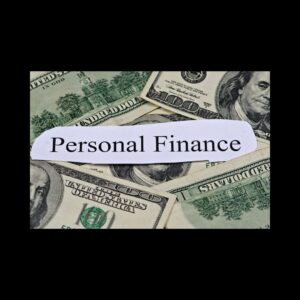I originally wrote my book Cash Uncomplicated for people who wanted to do better with their money and didn’t understand why they were constantly struggling with their personal finances. In the process of writing the book, I realized there are personal finance non-negotiables and “nice to’s.” The focus of this post is on the personal finance non-negotiables.
What is Personal Finance?
Personal finance is how individuals handle their money. It’s the philosophies, ideas, and mindset people have around money. That includes:
- Saving and investing
- Spending
- Reconciling delayed gratification with YOLO
- Earning more
- And many more
The beauty of personal finance is there are many ways to win. For one person, “winning” might mean maximizing their money and creating years of passive income. For another, “winning” could be having more time freedom and just enough money to live comfortably. There are no set rules with personal finance and winning takes many different shapes and forms.
Why Develop Personal Finance Non-Negotiables?
People who do well in life are intentional. Whether that’s a professional football star, a celebrity, or an average person who goes to a job each and every day and works hard to support their family. Success requires intentionality and personal finance is no different.
Success with personal finance requires intentionality–and developing and adhering to the non-negotiables is a critical component of that intentionality. The non-negotiables are your foundation, or your rock. Something to fall back on when other things fail.
Personal Finance Non-Negotiables
The personal finance non-negotiables are the few things that if done–and done right, will make your life exponentially easier. Those are:
- Know your values and be a value-based spender
- Pay yourself first
- Automate
- Spend less than your income
- Eliminate consumer debt
- Have the end in mind
The remainder of this post will be dedicated to these six non-negotiables.
Number 1: Know Your Values and Be a Value-Based Spender
What are your values? Not just financial values, but life values. Including family goals, career aspirations, lifestyle goals, etc. When we know and understand our values, it’s easier to make decisions.
For example, someone who highly values time with their family is going to make life decisions around getting to spend more time around their family. That might mean less hours at work, and possibly even giving up a higher paying job or more opportunity for more time. Conversely, a career driven person who values moving up the corporate ladder is going to spend more time and energy at work.
Values also translate into a term I frequently used in my book–and that term is value-based spending. Value-based spending is assessing your values and then spending on what you truly value along with necessities. So if someone highly values travel with their family, they are going to spend some of their money on family vacations.
Someone who highly values health and fitness is going to spend on a gym membership or fitness equipment. All purchases are made according to values–there is no buying anything to impress anyone or keep up with what the neighbors are doing. It’s strictly value-based.
Related: Value-Based Spending: How to Create a Budget Around What You Value
Number 2: Pay Yourself First
Paying yourself first is one of the most powerful strategies anyone can utilize for success with their personal finances. The concept of paying myself first is one that alluded me for a long time. I didn’t quite grasp the idea that I could invest first and live on the rest.
I had it backwards–I was using money to live first and investing what I had leftover. Inevitably, I’d have no money left over at the end of the month and would end up investing nothing. Over the course of several months and years, this had a large negative income on my earning potential and net worth.
Once I changed my paradigm to pay myself first, my personal finances took a 180. I invested my money first thing each month and my account begin to grow and grow. And I really didn’t miss the money at all. To be honest, I really didn’t notice that the money was missing after a couple months of paying myself first.
Related: How to Automate Your Money
Number 3: Automate
A direct follow up to pay yourself first is to automate. Automation is one of my personal finance non-negotiables because it makes things easy. Automation requires a little bit of work in the beginning, minor maintenance, and not much else. It’s something that has made my financial life exponentially easier without a lot of effort.
Rather than spend time each month deciding where your money is going, automation does it for you every month without fail. Simply set it up and occasionally make the needed updates. That’s it, there’s really not much more to it.
Automation is one of the best ways to ensure that you:
- Are paying yourself first
- Paying all your bills
- Allocating enough money for fun things like vacations and weekend trips
- Setting aside enough money every month to live on
Those who automate get the benefit of putting their personal finances on cruise control with occasional adjustments.
Number 4: Spend Less Than Your Income
Number four on the list of personal finance non-negotiables sounds obvious, but really isn’t. More than 14 million Americans have over $10,000 in credit card debt according to this article in Go Banking Rates. There are outlier cases where that debt is coming from extenuating circumstances like family emergencies or medical bills, but a large majority is from spending more than is coming in. Which is a challenge that can be solved by putting systems in place and staying disciplined.
To a degree, automation and paying yourself first can help protect against spending more than you earn. Pay yourself first via automation and then live off the rest. All that needs to be done from that point is to spend less than the remaining balance. Anything under that amount and you’re fine, anything over and changes need to be made.
Spending less than your income is a personal finance non-negotiable because it’s a way to guarantee you’ll never have consumer debt. It’s impossible to get into consumer debt if spending less than your income. Simple way to put it, but it’s true and effective.
Number 5: Eliminate Consumer Debt
Consumer debt is arguably the number one killer of personal finances and ability to build wealth. It’s literally paying for your purchases of the past–hindering your ability to invest in your present and future self. Consumer debt means you’re starting every month by making a payment for something you bought last month, last year, two years ago, or even longer.
Actually, it’s not just whatever you bought that you’re paying for, it’s also the interest accumulated on that purchase, or purchases. For example:
- The $850 dollar flatscreen you bought last year is actually costing you closer to $1,000
- Your car purchased for $26,500 a few years back is costing you closer to $30,000
- Tack on another $450 to the furniture you bought for $2,300
So consumer debt not only means that you’re starting every month in the hole, but you’ve also got interest payments on top of that. This stuff really adds up and compounded over several purchases, creates more of a crater than a hole.
Number 6: Have the End in Mind
One of my favorite books is The 7 Habits of Highly Effective People by Stephen Covey. In the book he has a chapter about beginning with the end in mind. It’s also one of my personal finance non-negotiables.
Whenever something is started, whether it involves personal finances or anything else like exercise, diet, career, etc–it’s important to have the end in mind. What are your goals, what do you hope to accomplish, what will you do when you reach your goals? These are all questions that help tease out what your end game is.
For example, it would help someone who wants to do better with their personal finances to figure out what they want. Otherwise it’s hard to make a plan not knowing what the end goal is. Someone who wants $5,000 per month in passive income doesn’t need to become a mega-millionaire.
Likewise, someone who wants several million in investments wouldn’t have their needs met with $5,000 per month in passive income.
Conclusion
There are a lot of moving parts in personal finance. New apps are constantly being developed to guide people with their money, financial advisors reach out for new business, and there are literally thousands of personal finance blogs online. That’s why it’s so important to have personal finance non-negotiables.
The non-negotiables cut through the noise and the distractions and narrow it down to just the important. That’s why I have my non-negotiables and why I believe everyone else should as well.
What are your personal finance non-negotiables?











